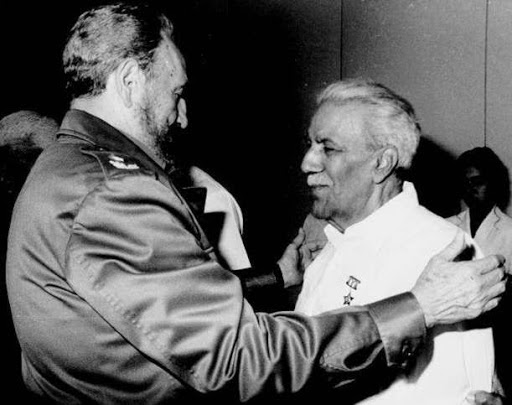
Havana, September 30th.- When Jesús Orta Ruíz, the Indio Naborí (1922–2005), formally embraced poetry, he seemed to accept from then on the highest risk of confronting the word in its origin.
With his extended verse, he gave us a personal and comprehensive definition of what is genuinely Cuban, from his creole perspective, a man of peasant roots expressed in words, in rural vowels filled with love and commitment to his homeland. Also from his generosity, simplicity, and kindness, characteristics that can be attributed to his humble origins.
This distinguished intellectual, National Literature Prize winner in 1995 and once nominated for the Prince of Asturias Award for Literature, often shared his anniversaries with readers as if it were the first day, telling them that years passed quickly when there were many things to do and say.
More than a dozen poetry books endorse his work. He spoke to us through poetry about his arrival at old age, memories, and reflections in Con tus ojos míos, a book of profound and unique richness in the dimension of human existence and time, dedicated to his wife Eloína. For him, the décima was "a cherished treasure that must be ennobled" and marks everything, because without the mystique of poetry, Cubans would be a people without wings.
Indio Naborí, also a journalist, often referred to his inspiration and reached out to the distance because "it is in that magical moment when a first verse gives me the tone of an entire poem."
Someone, quite rightly, defined him as the poet of the Cuban people. If we were to search in his work, as beautiful as his life itself, we would find that kind of verse that captures the history of the nation and venerates its leaders. We treasure, to the pride of Cubans, Esto tiene un nombre (Editora Política, 1999), a volume that compiles poems from the first 40 years of the Revolution, an epic poem led by Cubans.
The poems of this literary proposal emerged gradually, as he felt and wrote. Thus came the anthological Triumphal March of the Rebel Army (written on January 1, 1959), which has since been shared in the voices of hundreds of Cubans, not just artists. Even the closing poem, Felicidades, mi Revolución, on the occasion of the four decades of triumph.
Jesús Orta Ruíz, the unforgettable Indio Naborí, knew how to remain faithful to his time, to his poetry, to his Revolution. He offered us a poetic testimony, an epic of the transcendent, as valid and necessary as it is authentic; we will always remember him. (Text and photo: Radio Enciclopedia)